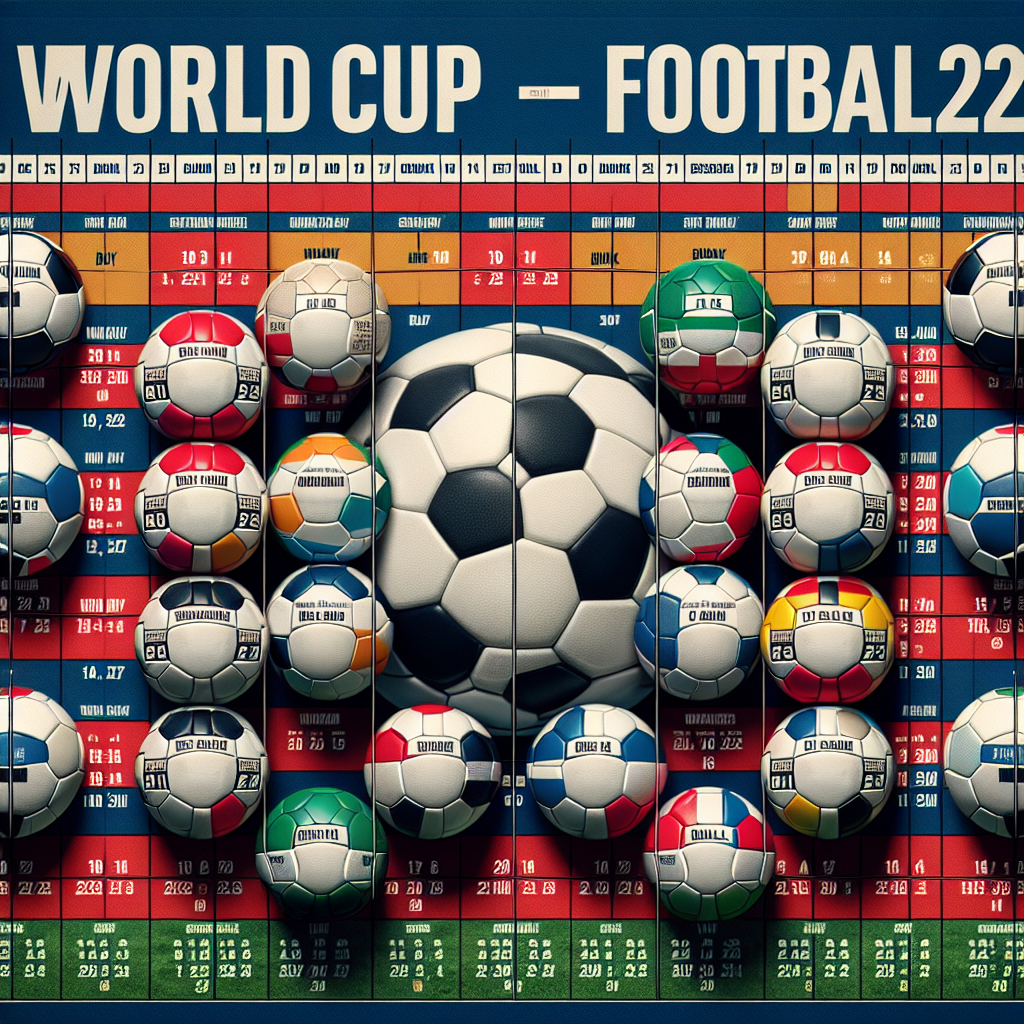World Cup Football 2022 Schedule: A Comprehensive Guide

The FIFA World Cup 2022, held in Qatar, was a landmark event in the history of football. As the first World Cup to be hosted in the Middle East, it brought together teams from across the globe to compete for the most coveted trophy in international football. This article delves into the intricacies of the World Cup 2022 schedule, providing insights into the tournament’s structure, key matches, and the unique challenges faced by teams and organizers.
Overview of the World Cup 2022 Schedule
The World Cup 2022 was unique not only because of its location but also due to its timing. Traditionally held in the summer months, the tournament was moved to November and December to avoid the extreme heat of the Qatari summer. This shift had significant implications for the global football calendar, affecting domestic leagues and international competitions.
Key Dates and Structure
The tournament kicked off on November 20, 2022, with the opening match featuring the host nation, Qatar. The final was held on December 18, 2022, coinciding with Qatar’s National Day. The tournament spanned 29 days, featuring 64 matches played across eight venues in five host cities.
- Group Stage: November 20 – December 2
- Round of 16: December 3 – December 6
- Quarter-finals: December 9 – December 10
- Semi-finals: December 13 – December 14
- Third Place Play-off: December 17
- Final: December 18
Group Stage: A Battle for Supremacy
The group stage featured 32 teams divided into eight groups of four. Each team played three matches, with the top two teams from each group advancing to the knockout stage. The group stage was marked by intense competition and several surprising outcomes.
Notable Matches and Upsets
One of the most talked-about matches was the clash between Argentina and Saudi Arabia, where Saudi Arabia pulled off a stunning 2-1 victory. This match set the tone for a tournament filled with unexpected results and thrilling performances.
Another highlight was the match between Germany and Japan, where Japan secured a 2-1 win, showcasing their tactical prowess and resilience. These upsets highlighted the unpredictable nature of the World Cup and the growing competitiveness of teams from outside traditional football powerhouses.
Knockout Stage: The Road to Glory
The knockout stage began with the Round of 16, where the intensity of the competition increased significantly. Teams had to navigate through single-elimination matches, with each game potentially being their last in the tournament.
Quarter-finals and Semi-finals
The quarter-finals saw some of the tournament’s most thrilling encounters. France faced England in a match that ended in a dramatic penalty shootout, with France emerging victorious. Meanwhile, Brazil’s clash with Croatia was another nail-biter, with Croatia advancing after a tense penalty shootout.
The semi-finals featured Argentina against Croatia and France against Morocco. Argentina’s Lionel Messi delivered a masterclass performance, leading his team to a convincing victory over Croatia. France, on the other hand, overcame a spirited Moroccan side to secure their place in the final.
The Grand Finale: A Clash of Titans
The final, held at the Lusail Iconic Stadium, was a fitting climax to a memorable tournament. Argentina faced France in a match that will be remembered as one of the greatest World Cup finals in history. The match ended in a 3-3 draw after extra time, with Argentina winning 4-2 on penalties.
Lionel Messi, playing in his last World Cup, was instrumental in Argentina’s victory, scoring two goals and converting his penalty in the shootout. This victory cemented Messi’s legacy as one of the greatest footballers of all time and ended Argentina’s 36-year wait for a World Cup title.
Challenges and Innovations
The World Cup 2022 was not without its challenges. The decision to host the tournament in Qatar was met with controversy, particularly regarding human rights issues and the treatment of migrant workers. However, the tournament also saw several innovations that enhanced the viewing experience and improved the game’s integrity.
Technological Advancements
One of the most significant innovations was the introduction of semi-automated offside technology, which helped referees make more accurate and timely offside decisions. This technology was part of FIFA’s ongoing efforts to leverage technology to improve the game.
Additionally, the use of advanced analytics and data-driven insights provided teams with valuable information to enhance their strategies and performance on the field.
Conclusion: A Tournament to Remember
The World Cup 2022 was a tournament that will be remembered for its thrilling matches, unexpected outcomes, and the crowning of a new champion. It showcased the global appeal of football and the sport’s ability to bring people together across cultures and continents.
As we look back on the tournament, several key takeaways emerge:
- The shift in schedule demonstrated the flexibility and adaptability of the global football community.
- The tournament highlighted the increasing competitiveness of teams from outside traditional football powerhouses.
- Technological advancements played a crucial role in enhancing the integrity and excitement of the game.
- Lionel Messi’s triumph with Argentina added a new chapter to his illustrious career, inspiring future generations of footballers.
In conclusion, the World Cup 2022 was a celebration of football’s enduring spirit and its ability to unite people worldwide. As we look forward to future tournaments, the memories and lessons from Qatar will continue to resonate with fans and players alike.